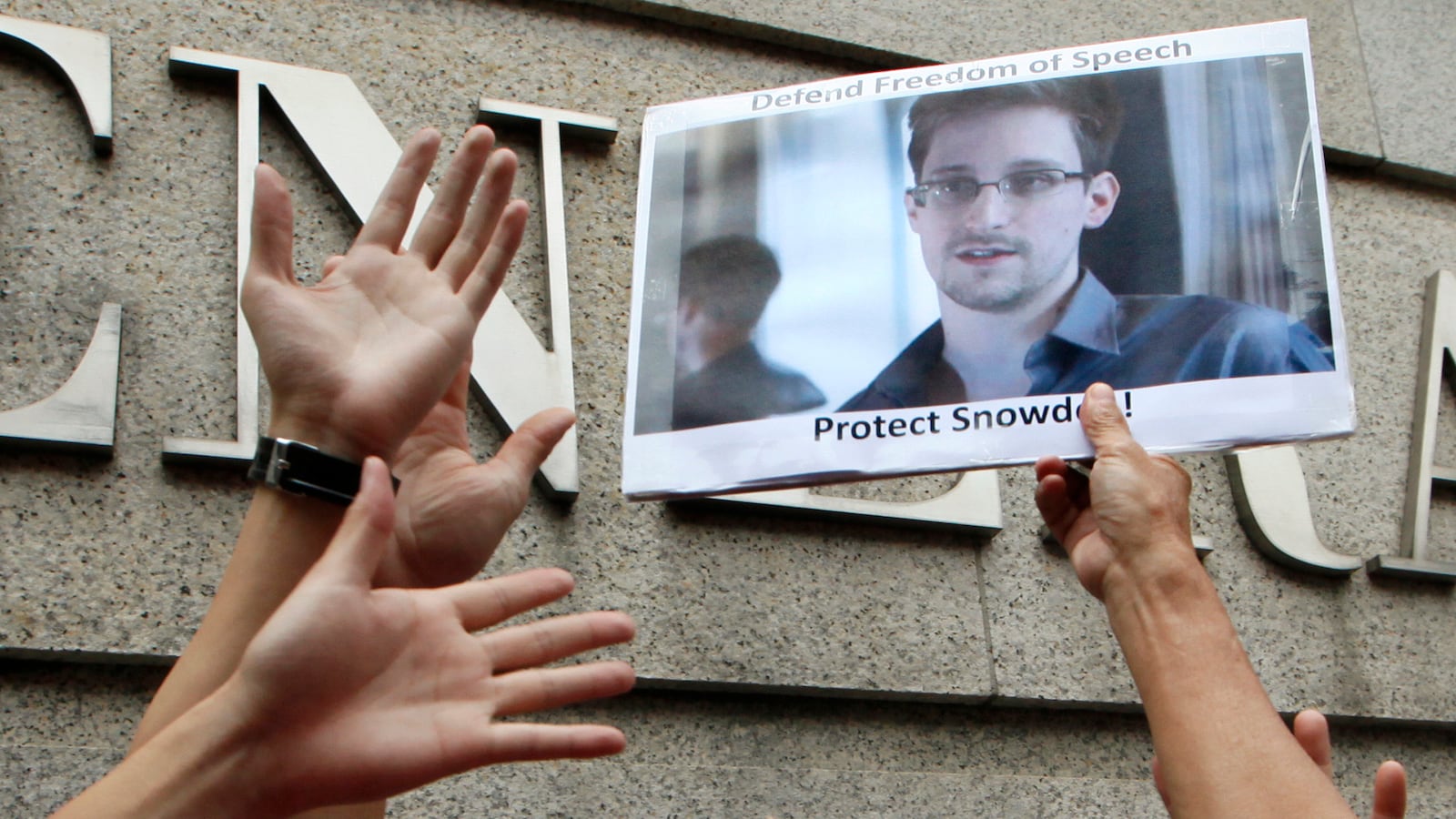I know, I know. We aren’t supposed to pay attention to Edward Snowden, the NSA leaker doing an uncanny Sir Alfred Mehran impression at Moscow’s Sheremetyevo Airport. It’s the drip, drip, drip of purloined documents that counts.
But a story this big, this consequential, needs a dramatis personae of dramatic people. So let’s offer Snowden a brief respite from the spotlight, pretend his motives are either pure or of little consequence, and instead turn our gaze toward those grandstanding politicians and activists demanding that our hero be left alone and all attention refocused on them.
After a few weeks of hypocritical outrage and bluster from Ecuador, Cuba, and every other recent recipient of Venezuelan largesse, the media gaggle has shifted to the blustering and outraged Bolivians. According to the Bolivian government, President Evo Morales’s plane, traveling from Moscow to La Paz, was diverted to Austria after rumors percolated that Snowden was on board. He wasn’t. Morales was said to have been “humiliated” by the unplanned stopover, the victim of yet another yanqui affront to Latin American sovereignty.
Indeed, the wonderful benefit of being a small, Hugo Chávez–influenced Latin American country is that employing measured language of diplomacy pays fewer dividends than unrestrained populist rage, something that one doesn’t frequently hear from the Obama administration. As Chávez well understood—having learned it from Fidel Castro—blame for any problem or self-inflicted disaster is best transferred to the malevolent agents of Washington imperialism.
As the plane drama unfolded, Bolivian Vice President Álvaro García Linera bellowed that Morales had been “kidnapped by imperialism” in an “act of imperial arrogance.” Upon returning to a “hero’s welcome” in La Paz, Morales also blamed “North American imperialism” for the flight rerouting. Ecuadoran President Rafael Correa tweeted that “either we graduated from being colonies, or we must claim our independence, sovereignty, and dignity.” Argentinian President Cristina Kirchner blamed the “vestiges of colonialism,” and live-tweeted her attempt at “diplomacy” with Austria (no grandstanding in that). Not one to be outdone, Venezuelan Foreign Minister Elías Jaua called the incident “totalitarian” and “fascist.”
A bit disproportionate, sure, but a clever way of staying relevant for a group of nations suddenly bereft of their charismatic leader—and stuck with his incompetent, unpopular, and charisma-deprived successor, Nicolas Maduro. But was anyone in the media, those spouting off on Twitter, attempting to verify the Bolivian story? After hours of assured reporting on the subject, fed to the media by Morales’s allies, the picture of imperialismo estadounidense became slightly cloudy. Much of the original narrative didn’t make sense (The Atlantic parsed the available information, concluding that the “tale of the re-routed Bolivian president’s plane is falling apart”). The story was complicated by a few important details: Morales’s plane didn’t leave from the airport housing Snowden but one on the other side of Moscow. There is also the emergence of an audio recording of the Bolivian pilot telling an air-traffic controller that “we need to land because we cannot get a correct indication of the fuel indication—we need to land.”
Now this doesn’t mean the United States didn’t intervene with its allies, but the timeline and details provided by Bolivia are certainly fishy. Such vague claims coming from the Obama administration would surely receive a healthy dose of skepticism (rightfully so, because the government is, in fact, constantly lying to us), while the Snowdenites appear rather too trusting of claims made by anyone declaring themselves an ally of “transparency.”
Another example: media outlets reported with surprising credulity that the Ecuadoran embassy in London, home to WikiLeaks boss Julian Assange, discovered a secret listening device installed in the ambassador’s office. Like the diverted flight, it’s a very real possibility. But be skeptical of the anti-imperialist grandstanders. The Guardian headlined its story: “Snowden row intensifies as hidden bug found in Ecuador’s embassy.” Compare this to the newspaper’s appropriately skeptical 2010 headline, when the Obama administration arrested an Iranian national suspected of planning to assassinate the Saudi ambassador to the United States (he was convicted in February): “Key players in the alleged Iranian assassination plot: The suspects, the alleged mastermind and the targets.”
And speaking of Assange, did anyone seriously believe that this seasoned grandstander wouldn’t attach himself like a barnacle to the Snowden story? As the NSA leak affair unfolded, Foreign Policy noted that Assange was “struggl[ing] to remain relevant.” Indeed, Snowden didn’t release his documents to Assange and, while praising Bradley Manning’s courage, noted that unlike WikiLeaks’s document dump “every single document I disclosed … was legitimately in the public interest.”
But Assange intervened, managing to irritate the Snowden family, the Ecuadoran government, and Guardian journalist Glenn Greenwald, who wrote the first story based on his leaks. (When WikiLeaks released a statement purporting to be from Snowden, Greenwald said that it was “flavored with some person who isn’t Edward Snowden,” with a “virulent tone to it that didn’t strike me as his own.”) The irrelevant Assange, who hasn’t leaked anything of consequence since the material provided by Bradley Manning, is weaseling his way back into the spotlight he so craves.
If we must remove focus from Snowden and train our attention back to the information he is releasing (we should keep focusing on both), let us not do the same for all of his self-appointed surrogates. Because many of the activists (like Assange) and governments (Ecuador, Bolivia, Venezuela, Cuba) speaking up on his behalf aren’t beacons of freedom, but canny political operators.






